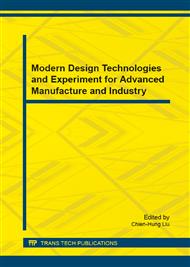p.1366
p.1370
p.1375
p.1380
p.1385
p.1390
p.1395
p.1400
p.1407
A Novel Non-Decreasing Temperature Based Simulated Annealing for Flow Shop Problems
Abstract:
The permutation flow shop problem (PFSP) is an NP-hard permutation sequencing scheduling problem, many meta-heuristics based schemes have been proposed for finding near optimal solutions. A simple insertion simulated annealing (SISA) scheme consisting of two phases is proposed for solving PFSP. First, to reduce the complexity, a simple insertion local search is conducted for constructing the solution. Second, to ensure continuous exploration in the search space, two non-decreasing temperature control mechanisms named Heating SA and Steady SA are introduced in a simulated annealing (SA) procedure. The Heating SA increases the exploration search ability and the Steady SA enhances the exploitation search ability. The most important feature of SISA is its simple implementation and low computation time complexity. Experimental results are compared with other state-of-the-art algorithms and reveal that SISA is able to efficiently yield good permutation schedule.
Info:
Periodical:
Pages:
1390-1394
Citation:
Online since:
May 2015
Authors:
Price:
Сopyright:
© 2015 Trans Tech Publications Ltd. All Rights Reserved
Share:
Citation:


